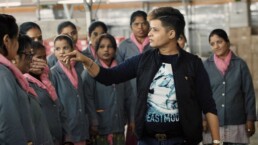‘Pink Belt’ Review: Changing the World One Self-Defense Class at a Time
'Pink Belt' also serves as a universal reminder that while we can't change the past we can always change the future.
In the documentary Pink Belt, director John McCrite shines a light on India’s beloved feminist icon: Aparna Rajawat. Aparna is highly regarded as a changemaker in the city of Agra, saving the lives of young women and girls one self-defense class at a time. Having grown up in a dysfunctional household, Aparna knows firsthand just how toxic and dangerous it is to be a woman in India without the resources to protect yourself. Pink Belt follows a very special period in Aparna’s life as she attempts to break the Guinness World Record for the most women trained in a self-defense lesson, to bring attention to her organization, Pink Belt Mission.
The Wonder Girl from India
Aparna is a local legend in India’s sports scene. As a child, she received world attention by winning India’s national championship in martial arts. Growing up, however, she was not treated with dignity or respect. In candid interviews, she shares that the gender disparity was so apparent that she resorted to cutting her hair to pass as a boy so she could take karate lessons and learn how to defend herself. Her small frame and short haircut allowed her to experience the disparity of privileges that only males were accustomed to. As unbelievable as it sounds, Aprana admits that girls can’t even fly a kite without getting in trouble.
Aprana also faced physical and sexual abuse at the hands of a cousin that went undetected for years. The inequality of the power dynamic between genders disgusted her and catalyzed her life’s mission: To create a training program that would educate future generations of young girls about self-defense.
Before diving into Aparna’s incredible success story of founding Pink Belt Mission, let’s set the scene for what it’s like to be a woman in India. Every 30 minutes, a woman is raped. Many suffer equally horrific conditions within their intimate relationships Nonconsensual sex, torture, and abuse, including acid attacks, are normalized. Aparna’s mother was married off at 12 years old to her father, who was 21 years old. It was not uncommon for women to be considered property, void of personal rights. These are just some of the reasons why Aparna makes it her life’s mission to insert some control into the hands of women, by teaching them self-defense skills. As feelings of empowerment grow, so does the realization that women don’t have to rely on their abusers for freedom, be it financial or otherwise.
Changing the World, and Breaking Records, One Self-Defense Class at a Time
Aparna founded Pink Belt Mission to empower young women to feel confident and safe in their home country. The documentary chronicles this life-changing organization in great detail, interviewing survivors of assault and hearing their harrowing stories of violence. Filmmaker John McCrite traces the lead-up to the Pink Belt Mission’s big event that could potentially gain the spotlight of worldwide attention. Aparna and over 7,000 women and girls attempt to break the Guinness World Record for the largest single group self-defense lesson. Not only does this serve as educational for the attendees, but it fulfills the mission of drawing media attention to the mission’s cause.
Takeaway
Pink Belt tells a complicated story of both tragedy and inspiration. While it is a heartbreaking account of mistreatment, it is also incredibly aspirational to see women finally fighting back. Aparna Rajawat is a fascinating storyteller, allowing the audience to experience some of the most intimate moments of her life. Aparna’s story is one that needed to be told, and John McCrite tells it with dignity and respect. Pink Belt also serves as a universal reminder that, while we can’t change the past, we have the power to change the future.
Morgan Rojas
Certified fresh. For disclosure purposes, Morgan currently runs PR at PRETTYBIRD and Ventureland.


